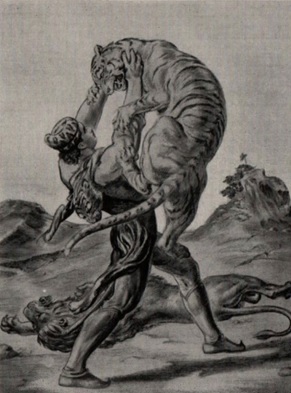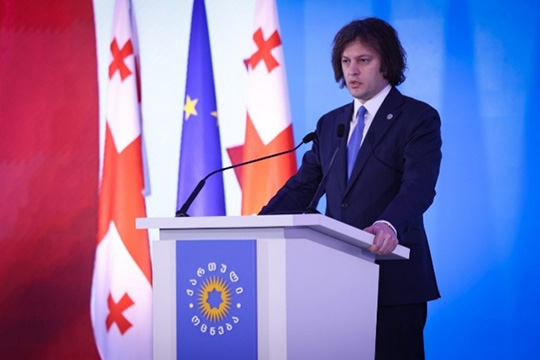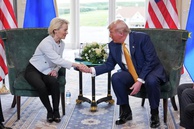
Although the anti-government protests in Georgia, which have been going on for over 200 days following last year’s parliamentary elections, are gradually waning, they haven't ceased completely as they continue to receive external support in the form of actions and statements from Western backers and supporters of the country’s previous regime.
On June 19, the European Parliament adopted, in a majority vote, another critical resolution on the political situation in Georgia with 324 MEPs of the 436 present at the plenary meeting voting in favor, 25 against, and 87 abstaining.
The document predictably lists and labels as "draconian" laws and amendments recently passed by the ruling Georgian Dream party. The European MPs believe these laws reflect a dangerous acceleration of the country’s slide back from democracy and are aimed at persecuting the political opposition. The resolution reiterates a previous call for sanctions against Georgia.
Ignoring the outcome of last year’s elections, the resolution refers to Salome Zourabichvili as "president" and describes the Georgian Dream government as "self-proclaimed and having seized the country."
In Tbilisi, where such pronouncements have previously been dismissed as "shameful waste paper," the report was deemed "absolutely uninteresting," while the situation within the European Parliament itself was described as "very sad, alarming, and tragic."
“The resolution lays bare the West's double standards and that principles such as transparency, the rule of law, and the inadmissibility of hate speech are selectively applied to Georgia,” said Irakli Kadagishvili, a member of the ruling Georgian Dream party.
Furthermore, 30 MEPs have proposed to the EU Commissioner for Neighborhood Policy, Olivér Várhelyi, that financial aid to Tbilisi be suspended and trade agreements, including the Deep and Comprehensive Free Trade Area (DCFTA), be reviewed. They also demanded sanctions against members of Georgia’s ruling class, allegedly responsible for undermining democracy, and an official review of Georgia's candidate status for EU membership. As a result, five EU countries, as well as the UK, the US, and Ukraine, have imposed visa sanctions on more than 300 Georgian officials.
On June 23, EU foreign ministers once again reviewed the Georgian authorities’ actions. After a ministerial level meeting of the EU Council, the EU’s High Representative for Foreign Affairs and Security Policy Kaja Kallas told reporters in Brussels that the Council would revisit the issue in July to reach an agreement on the imposition of sanctions.
Less than a week after the European Parliament passed their anti-Georgia resolution, the Parliamentary Assembly of the Council of Europe (PACE) started debating the situation in Georgia.
Here it’s worth mentioning the fact that Georgia suspended its participation in PACE in January following the imposition of restrictions on its mandate. Full recognition required concessions from the Georgian authorities reflecting PACE’s burning desire to exert ultimate influence over Georgian politics. The attempt fell flat, resulting in the Georgian delegation suspending its participation in the Assembly’s work, "until Europe recognizes Georgia's sovereign interests and sovereignty on its own territory and engages with the Georgian people as equals, without unacceptable colonialist overtones."
Still, the June 26 session stated once again that “the curtain on Georgia’s democratic future is falling,” that “their geographical location is not enough reason for becoming part of Europe.” It also deemed it necessary speedily “freeze [the Georgian authorities’] assets, restrict their access to Western education and institutions.” And, as if it was not enough, the session also called for “preventing them from spending holidays abroad.” Topping off the Danish, British and Baltic delegates’ oft-repeated bemoaning of the alleged denunciation by Georgia of the “common values,” was a loudmouthed rant by a notoriously scandalous Ukrainian delegate, who declared, “We must do everything possible to save Georgia from Moscow! Let’s return Georgia to the Georgian people! Long live Georgia!”
On can only wonder, just how the Georgian delegation had managed to work so long in a place like PACE.
Meanwhile, Washington was the first to take on the right to dictate its terms, to show a condescending and dismissive attitude towards Georgia and openly attack the country. On May 30, 2024, the United States announced a review of relations with Georgia following the adoption by Tbilisi of the law on "foreign agents," and suspended the "Strategic Partnership" agreement with Georgia signed 15 years prior. In early September of last year, the United States introduced a "wide range of measures" targeting a number of Georgian politicians and civil servants who, according to Washington, "undermine democracy in the country and violate human rights." In addition, the United States imposed financial sanctions against Bidzina Ivanishvili, the honorary chairman of the ruling Georgian Dream party.
Those unfriendly moves by the United States have not been lost on Tbilisi with parliamentary majority member Givi Mikanadze denouncing the US State Department's sanctions against high-ranking Georgian officials ahead of the country's parliamentary elections as interference in the election process. Earlier, parliamentary Speaker Shalva Papuashvili compared the US sanctions to an open attack on the country. He also described as “unfair” Washington’s decision to side with the protesters in Georgia, and dismissed the US accusations against the Georgian authorities as "false."
In early May, Georgia’s State Security Service announced that its operatives were working on yet another fake report: "We call on diplomatic missions accredited in Georgia to respect the activities of the services responsible for security, to show greater responsibility and to refrain from disseminating statements that have not been agreed upon with the relevant agencies," the statement said.
As it turned out, all these moves, instigated by representatives of the “deep state,” had been prompted by a special resolution approved by the Georgian parliament in response to the MEGOBARI Act (from the Georgian word “megobari” – “friend”) adopted by the US House of Representatives. The Georgian resolution was a clear response to all the accusations voiced by the Americans. The MEGOBARI Act states that the US should support the Georgian people, while simultaneously imposing sanctions on Georgian politicians and their family members responsible for the adoption of the law on “foreign agents.” Republican Congressman Joe Wilson, reportedly the main initiator of the MEGOBARI Act, is a regular critic of the Georgian authorities. According to him, Georgia’s ruling party and the government of Irakli Kobakhidze “have turned into a repressive Americanophobic mafia group” that is trying to “sell Georgia to the opponents of the US” at a time when the opposition “goes out to protest with American flags.” As you can see, the bottom line of the Congressman’s criticism is the fact that American interests are not being taken into account in Georgia.
According to the Georgian government, the so-called MEGOBARI Act is based on three main false accusations: a) significant democratic backsliding in Georgia; b) Georgian authorities are blocking Euro-Atlantic integration; and c) Georgia is establishing inappropriate ties with "Russia, China, and other authoritarian regimes."
Georgian MPs emphasize that the MEGOBARI Act passed by the US Congress requires no special analysis, as it "exudes hostility towards Georgia, the Georgian people, and the country's government. Moreover, it contains technical flaws, factual inaccuracies, and logical inconsistencies… The MEGOBARI Act is driven by the ‘deep state's’ open hostility towards Georgia.”
Tbilisi has repeatedly stated that the double standards and negative attitude towards Georgia stem primarily from the country's refusal to open a "second front" against Russia.
Earlier, Georgian Prime Minister Irakli Kobakhidze sent an open letter to US President Donald Trump and Vice President J.D. Vance referencing the planned consideration of the MEGOBARI Act in the US Senate after its passage by Congress. He expressed concern that the Georgian government's proposal to reset relations with the US "from scratch" had been ignored.
"It seems that the claims of defeating the 'deep state' are merely an attempt at rebranding and nothing more,” Kobakhidze wrote. “However, we remain optimistic that Your administration will truly be able to defeat the 'deep state,' which would undoubtedly help reboot Georgian-American relations and the restoration of strategic partnership. Otherwise, the revolutionary scenario planned under the Biden administration will continue. We remind you that up to 250 people, trained and funded by USAID and NED, still gather daily on the central avenue of the capital, which is undeniable proof that the 'deep state's' plan for a revolution has not been abandoned."

In his late-June annual report to parliament on the government’s performance, Irakli Kobakhidze said that Georgia had been attacked by external forces due to a perception of the country's weakness.
“Some people believed that a foreigner could dictate laws to Georgia. I remember how, just a few years ago, foreigners, including diplomats with no legislative expertise, participated in drafting laws, often bypassing us,” Kobakhidze said.
He also alleged that external forces dictated ministerial appointments, including of the Minister of Internal Affairs. “Such things happened some time ago. They believed that someone could not recognize the results of the parliamentary elections, not enter our legislative body, and so we would have to start negotiations and sign the imposed anti-constitutional agreement," Kobakhidze said.
He added that these are a thing of the past now.
"We will not allow arbitrariness and violence against the Georgian state under any circumstances," Kobakhidze emphasized, asserting that Georgia will not tolerate any attempts to undermine state sovereignty, the identity of the state and forcibly impose false values.
The Prime Minister also said that Georgia was expecting reciprocal steps from the Trump administration and expressed hope that "the strategic partnership between Georgia and the United States will be restored."
However, amid “expectations of reciprocal steps,” a US military intelligence report alleges that the ruling Georgian Dream party is creating conditions for strengthening Moscow's influence in Georgia. This being said, the White House has recently sent out signals of improved relations, evidenced by a visit from Georgia's First Vice Prime Minister and Minister of Economy and Sustainable Development, Levan Davitashvili, who, returning home after a series of meetings at the State Department, voiced optimism regarding improved relations. He even claimed complete agreement with the new US administration on key issues. This assessment is not shared by the Georgian opposition, though.
Are there signs of a reset in Georgia's relations with the European Union?
The EU's main problem with ramping up anti-Georgian policy and imposing new sanctions is the lack of a unified stance on Georgia, with Hungary and Slovakia opposing sanctions against the Georgian government. The Georgian Dream party considers Hungarian Prime Minister Viktor Orban a key ally within the EU. Last year, Orban flew to Tbilisi to personally congratulate the Georgian Dream on its victory. Since then, Kobakhidze and Orban have met almost monthly, last meeting on May 28 at a conference of "conservatives" in Budapest, where the Hungarian prime minister said that "Irakli Kobakhidze is a Georgian hero, an international patriot who won the elections, went against liberal movements and defeated everyone - he did not bow to Brussels." Orban also spoke of the Georgian government as "an animal that Brussels fears" and promised support.
“Everyone is jealous of Georgia – and so are we,” Orban said.
Conversely, the Netherlands, Latvia, Lithuania, Estonia, and particularly Poland, advocate for a tougher stance, leading to the EU's suspension of visa-free travel for Georgian diplomatic passport holders.
Irakli Kobakhidze said that this would undermine the Georgians’ trust in European structures. At the same time, European Commissioner for EU Enlargement, Marta Kos, said that the EU does not want “to lose Georgia,” fearing that an excessively harsh sanctions policy could provoke anti-Western, Eurosceptic sentiments in the republic. And signs of this sentiment are already visible in Georgia, where the majority of the population resents the policy of the European Union and the collective West as a whole towards their country.
The West has already acknowledged how difficult it may prove to overthrow the current Georgian government through a color revolution. Three or four previous attempts have all failed, and it may take the West some time to realize that a stable Georgia, even governed by a political force undesirable for them, is preferable to the instability and chaos that a collective opposition can lead to.
“We emphasize that there is a certain significant injustice in relation to Georgia that must be rectified,” the republic’s authorities say.
Ultimately, neither European capitals nor Washington can entirely disregard the OSCE's de facto recognition of the election results.
Georgia cherishes its history, traditions, family, respect for elders, mutual assistance, friendship, and justice. The medieval poet and public figure Shota Rustaveli, author of "The Knight in the Panther's Skin," has played a significant role in shaping these values. The poem centers on the optimistic theme of justice prevailing over tyranny and good over evil.
Georgia is ready for new challenges, actively participating in ongoing processes, and is determined to secure its rightful place in them.
The views of the author may differ from the position of the Editorial Board.
read more in our Telegram-channel https://t.me/The_International_Affairs

 12:56 03.07.2025 •
12:56 03.07.2025 •


























